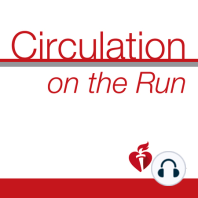17 min listen
Circulation September 13, 2022 Issue
ratings:
Length:
25 minutes
Released:
Sep 12, 2022
Format:
Podcast episode
Description
This week, please join authors Svati Shah and Senthil Selvaraj as well as Guest Editor and Editorialist Manuel Mayr as they discuss the article "Metabolomic Profiling of the Effects of Dapagliflozin in Heart Failure With Reduced Ejection Fraction: DEFINE-HF" and the editorial "SGLT2 Inhibitors in Heart Failure: Targeted Metabolomics and Energetic Metabolism." Dr. Carolyn Lam: Welcome to Circulation On Run, your weekly podcast summary and backstage pass to the journal and its editors. We're your co-hosts, I'm Dr. Carolyn Lam, Associate Editor from the National Heart Center and Duke National University of Singapore. Dr. Greg Hundley: And I'm Dr. Greg Hundley, Associate Editor, Director of the Pauley Heart Center at VCU Health Richmond, Virginia. Dr. Carolyn Lam: In today's feature paper, we will be talking about the metabolomic profiling of the effects of dapagliflozin in heart failure, and this is from the DEFINE-HF trial. It's just such a cool paper with a lot of insights you have to hear from the authors. But, before we get there, let's talk about some of the other papers in today's issue. Shall we, Greg? Dr. Greg Hundley: You bet, Carolyn. Well, how about if I go first? Dr. Carolyn Lam: Please. Dr. Greg Hundley: Thank you, Carolyn. My first paper comes to us from Professor Paulus Kirchhof from the Universitäres Herzzentrum in Hamburg. Carolyn, in the randomized EAST-AFNET 4 study, so the early treatment of atrial fibrillation for stroke prevention, these trial investigators demonstrated that systematic initiation of early rhythm control reduced adverse cardiovascular outcomes in patients with recently diagnosed atrial fibrillation and stroke risk factors. However, the effectiveness and safety of early rhythm control in patients with multiple cardiovascular comorbidities is not known. Carolyn, in this study, it was a prespecified sub-analysis of the EAST-AFNET 4 trial and it compared the effectiveness and safety of early rhythm control with usual care stratified into patients with high CHA2DS2-VASc scores of greater than or equal to 4. Dr. Carolyn Lam: Nice. Okay. Important question, what did they find? Dr. Greg Hundley: Right, Carolyn. Quite a bit of data in this study, so let's walk through it carefully. First, in regards to the study population, the EAST-AFNET 4 randomized 1093 patients with CHA2DS2-VASc scores of greater than or equal to 4, these were predominantly women, 61% female, and then also 1,696 patients with CHA2DS2-VASc of less than four, and these were predominantly men, so only 37% women. Now let's get to the date. Early rhythm control reduced the composite primary efficacy outcome of cardiovascular death, stroke, or hospitalization for worsening heart failure or for acute coronary syndrome in patients with high CHA2DS2-VASc scores of greater than 4, but not in patients with CHA2DS2-VASc scores of less than 4. Second, now Carolyn, the primary safety outcome, so death, stroke, or serious adverse events of rhythm control therapy, was not different between study groups in patients with high CHA2DS2-VASc scores of greater than 4, but occurred more often in patients with low CHA2DS2-VASc scores randomized to early rhythm control. Now Carolyn, life threatening events or death were not different between the groups. When female sex was ignored for the creation of high and lower groups, the interaction P was not significant for the primary efficacy outcome, but remained significant for the primary safety outcome. Dr. Carolyn Lam: Oh, you are right. A lot of interesting data here. What's a take home message? Dr. Greg Hundley: Right, Carolyn. So the take home message is the following. Patients with recently diagnosed atrial fibrillation and multiple cardiovascular comorbidities should be considered to have priority access to early rhythm control to reduce cardiovascular outcomes, and a specific trial of early rhythm control in these patients is really needed as a next step. Dr. Carolyn Lam: Oh, thank you, Greg. The next
Released:
Sep 12, 2022
Format:
Podcast episode
Titles in the series (100)
Circulation January 24, 2017 Issue: Circulation Weekly: Your Weekly Summary & Backstage Pass To The Journal by Circulation on the Run
